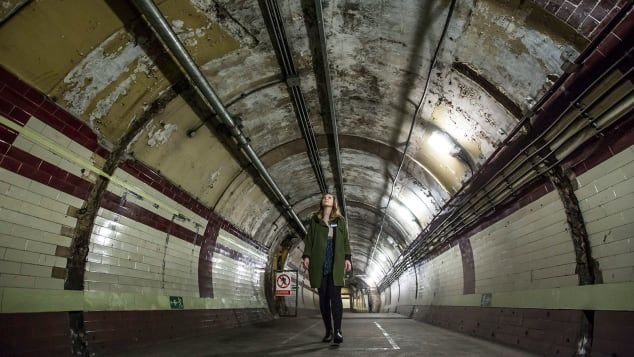
The secret underground bunker which helped win World War II
Now, the opportunity has come round again to slip behind the door of the abandoned Down Street Tube station and descend by torchlight into the World War II hideaway from which campaigns such as the D-Day landings and the Dunkirk evacuation were coordinated.
Britain's Prime Minister Winston Churchill sheltered here -- in secret -- in November and December 1940, when the German bombing campaign known as The Blitz was at its height, and a team of 40 staff worked here day and night on the war effort.
While the better known Churchill War Rooms, a British government command center throughout the war, is open to the public as part of the Imperial War Museum, tours of Down Street are a much more infrequent delight.
CNN Travel got a preview of the experience, ahead of a new batch of London Transport Museum's Hidden London tours going on sale on December 3.
An ideal bunker
 Tickets for the latest Down Street tours go on sale on December 3.
Tickets for the latest Down Street tours go on sale on December 3.
Historian and guide Siddy Holloway meets us at ground level, where the distinctive Leslie Green oxblood-tiled arches of the facade are still the same as at the many other famous Edwardian Tube stations he designed, including Covent Garden and Russell Square.
Down Street opened in 1907 and served the Piccadilly line but by 1932 it had already closed. In the heart of affluent Mayfair, a short walking distance from what are now Hyde Park Corner and Green Park tube stations, it was an underused station. In addition, it was particularly deep underground and there were long passageways taking it under the busy Piccadilly thoroughfare.
However, after seven years of disuse, explains Holloway, "All of the things that made it not viable as a station made it absolutely perfect for secret bunkers during the Second World War."
When war was declared in 1939, Down Street was converted in a matter of days into the new headquarters of the Railway Executive Committee. The REC acted as an intermediary between the War Office and Britain's rail companies and would be crucial to the movement of troops, horses and equipment in the fight ahead.
Underground offices
Descending to the platforms today, it's still clear that this is a Tube station like no other. Ancient signage points the way "To Offices" and the "Committee Room," the draftsman's pencil marks still visible in some areas. Mustard-colored plasterboard clings to the tiles -- vestiges of an attempt to create an office-like environment -- while the floor has been leveled to create the typing pool where up to eight secretaries would sit and clack at their keys.
Staff lived and worked down here, working shifts of up to 12 hours, often overnight, perhaps only surfacing for air in the upper world every ten to 14 days. Grimy baths and toilets are what remains of the washroom facilities, while soot obscures the patterned wallpaper in the executive sleeping quarters.
Still, there was opulence here, after a fashion. "Bunkers and shelters were off-rations during the war," says Holloway. A much higher class of food was to be enjoyed here than by civilians above ground. The REC was the same company behind Britain's many grand railway hotels, and the staff here were able to dine on crystal dining ware and wash at Royal Doulton sinks.
There was a fully staffed kitchen and two mess rooms, with waiting staff as well, and 27,000 meals were prepared and eaten here each year.
Brandy and cigars
The War Rooms, just a mile or so from Down Street, on the other side of Buckingham Palace, were underground but weren't bomb-proof. "If they received a direct hit, you'd obliterate everyone in there," says Holloway. "By November 1940, people [had] started fearing for the life of Winston Churchill."
Ralph Wedgwood, chairman of the Down Street facility and brother of the British member of parliament Josiah Wedgwood, convinced Churchill to come to Down Street "because it's so close to the seat of power," says Holloway. It's very comfortable, It's very private, it's very well provisioned with brandy and cigars and things like that."
Churchill stayed overnight down here at least five times in the winter of 1940, having been sneaked in at ground level and then, again, his presence hidden from most of the Down Street staff. While he slept on a modest camp bed, in the executive mess room, at least, he was able to live life well. The civil servant John Colville recalled in his diaries that at Down Street they were treated to caviar, Perrier-Jouet Champagne and 1865 brandy.
London's disused stations
The other Hidden London tours which are restarting for the first time since March 2020 are of the disused stations and tunnels at Euston, Moorgate and Aldwych, all of which have their own unique character and histories.
Aldwych, the most famous, provided shelter to ordinary Londoners during the Blitz, and has been used for film and TV shoots including "Darkest Hour" and "Sherlock".
The Down Street tours are the highest priced, at £85 for adults and £80 concessions ($112 and $106), while the other station tours are £41.50 full-price and £36.50 concessions.
The Down Street and Euston tours run on selected dates between January 15 and February 13, 2022, while the Moorgate and Aldwych tours will take place on selected dates between March 2 and 27, 2022.
Tickets go on general sale on December 3 but, a word of warning, they usually sell out very, very fast. There is, priority booking available on December 2 to London Transport Museum newsletter subscribers. To sign up and to get more information on individual tours, visit ltmuseum.co.uk.
If you miss out on the station trips, there are also walking tours above ground and the Hidden London exhibition at the London Transport Museum in Covent Garden.










